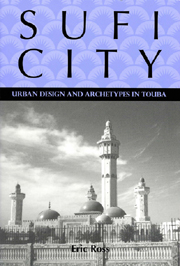Book contents
- Frontmatter
- Contents
- List of Illustrations
- List of Appendixes
- Acknowledgments
- Note on Translation, Spelling, and Transliteration
- Introduction
- 1 Archetypes: Sufi Phenomenology and the Semiosis of Landscape
- 2 Urban Design: The Spatial Configuration of a Spiritual Project
- 3 Marabout Republics Then and Now: Autonomous Muslim Towns in Senegal
- 4 The Pénc: Trees and Urban Design in West Africa
- Conclusion
- Appendix 1
- Appendix 2
- Appendix 3
- Appendix 4
- Appendix 5
- Appendix 6
- Appendix 7
- Notes
- Bibliography
- Index
- Rochester studies in African History and the Diaspora
1 - Archetypes: Sufi Phenomenology and the Semiosis of Landscape
Published online by Cambridge University Press: 12 September 2012
- Frontmatter
- Contents
- List of Illustrations
- List of Appendixes
- Acknowledgments
- Note on Translation, Spelling, and Transliteration
- Introduction
- 1 Archetypes: Sufi Phenomenology and the Semiosis of Landscape
- 2 Urban Design: The Spatial Configuration of a Spiritual Project
- 3 Marabout Republics Then and Now: Autonomous Muslim Towns in Senegal
- 4 The Pénc: Trees and Urban Design in West Africa
- Conclusion
- Appendix 1
- Appendix 2
- Appendix 3
- Appendix 4
- Appendix 5
- Appendix 6
- Appendix 7
- Notes
- Bibliography
- Index
- Rochester studies in African History and the Diaspora
Summary
The city of Touba is named for ṯûbâ, the Tree of Paradise of Islamic tradition. The term ṯûbâ, usually translated as “bliss,” felicity,” or “prosperity,” appears once in the Koran, where it describes Divine recompense in the Hereafter for the righteous: “Those who believe and do the right, for them is bliss (ṯûbâ lahum), and an excellent resting place” (13:29). It is also used as a blessing, ṯûbâ!, indicating an invocation of God's grace. Its use as a designation for the Tree of Paradise is not, however, Koranic; it is based on ẖadîth reports. In Ibn Hanbal's Al-Musnad, ṯûbâ is used as a proper noun, as a name for “a tree in the garden [of Paradise] one hundred years wide.” Concepts related to this paradisiacal tree inform every aspect of the city: its legendary foundation, its spiritual and social mission, and its spatial configuration.
Touba was founded beneath an actual tree where Ahmadou Bamba Mbacké experienced a transcendent moment of mystic illumination. In the Mouride understanding of the event, God guided Ahmadou Bamba to the site so that he could establish a “straight” community there. Touba is an actualization of the “Straight Path” of Islam, the sirât al-mustaqîm cited in the opening chapter of the Koran. This is the path of righteous life on earth. From an eschatological perspective, it leads to favorable judgment on the Day of Resurrection, and then on to eternal bliss (ṭûbâ) in Paradise. God's promise of eternal bliss for the righteous (ṯûbâ lahum) was one of Ahmadou Bamba's foremost preoccupations.
- Type
- Chapter
- Information
- Sufi CityUrban Design and Archetypes in Touba, pp. 11 - 42Publisher: Boydell & BrewerPrint publication year: 2006



